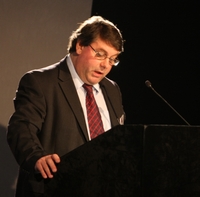Peter Kindersley has written a letter to the BBC due to his concern about the apparent bias in last week’s edition of Horizon on BBC2 – Jimmy’s GM Food Fight.
Please feel free to use this example to send your own opinion to the BBC about this programme. You can send your views via www.bbc.co.uk/complaints
= = = = = = = =
BBC Complaints
PO Box 1922
Glasgow
G2 3WT
Dear BBC,
Horizon, BBC2, Tuesday, 25 November 2008
Jimmy’s GM Food Fight
We would like to complain that the above edition of Horizon. The programme seemed to show a strong bias in favour of GM crops, and it was misleading in the portrayal of the debate – currently at a very important stage – surrounding genetically modified organisms and the appropriate use, risk assessment and regulation of biotechnology in food production.
GM crops were described as being good for the environment, indeed better for the environment, than conventional crops. This focussed on vague examples with regard to pesticides only; and the programme lacked a wide perspective on the necessary environmental impact analysis – with no comparison to ecological systems.
Despite Horizon showing that massive deforestation is taking place to make way for Argentina’s fast-growing industrialised farming system, this impact was not explored and issues of greenhouse gas emissions, soil carbon loss, biodiversity destruction and land ownership were not looked into. Neither was the sustainability of reliance on fossil fuels which GM depends upon, as a continuation of the industrialised agricultural approach. This failure to examine the issues, whilst broadcasting the idea that GM crops are good for the planet, comprises a narrow and biased viewpoint.
GM crops were also described as having better potential for being able to fulfil the food needs of the world. The example of a GM banana project in Uganda was portrayed as a successful and clear example – a known failure to protect against the Black Sigatoka fungus, announced as early as June 2008 [1]. We know from the organisation GM Freeze that the BBC Trust and the makers of BBC2’s Horizon were made aware prior to transmission of this clear contradiction between reality in Uganda and what the programme stated. [2]
We are concerned about a number of factual errors, misleading remarks and omissions:
1. Claims that GM herbicide tolerant crops had reduced pesticide usage ignores research to the contrary due to the development of weed resistance. [3]
2. Claims that gene transfer between crops and wild plants were hypothetical when they have already been shown in the field in the UK, Mexico and Canada.
3. Failure to fully examine the environmental, social and economic impacts of GM soya production in Argentina.
4. Omission of any mention of the use of patents to control global seed markets by the biotech corporations and the impact on farmers’ rights to save seed and on agricultural biodiversity.
5. Failure to examine the health and sustainability aspects of Ugandan diet based largely on cooking bananas.
6. Failure to look at alternative solutions to tackling food security and environmental problems in clearly set out in the International Assessment of Agricultural Knowledge, Science and Technology for Development (IAASTD) [4] and UN/UNCTAD report published in 2008. [5]
We hereby request an official and public apology for the misrepresentation of the facts, in particular, the example of the Uganda GM bananas despite the BBC and the editor of Horizon having the true facts of the case – this being yet another example of failed GM promises.
We urge the BBC to produce a second broadcast – in the public interest – to properly enable an opportunity for the scientific claims and counter-claims about GM crops to be made within a more comprehensive scope, and without bias.
We would appreciate a reply to this letter, with referral to each of our points. Thank you.
Yours faithfully,
References
1. See http://africasciencenews.org/asns/index2.php?option=com_content&do_pdf=1&id=487
2. Letter from GM Freeze, Friends of the Earth and The Ecologist to the Chair of the BBC Trust. See: http://www.gmfreeze.org/page.asp?id=353&iType=
3. GE [genetically engineered] corn, soybeans and cotton have led to a 122 million pound increase in pesticide use since 1996. While Bt crops have reduced insecticide use by about 15.6 million pounds over this period, HT [herbicide tolerant] crops have increased herbicide use 138 million pounds. Bt crops have reduced insecticide use on corn and cotton about 5 percent, while HT technology has increased herbicide use about 5 percent across the three major crops. But since so much more herbicide is used on corn, soybeans and cotton, compared to the volume of insecticide applied to corn and cotton, overall pesticide use has risen about 4.1 percent on acres planted to GE varieties. – Charles M. Benbrook, “Genetically Engineered Crops and Pesticide Use in the United States: The First Nine Years.” Biotech InfoNet, Technical Paper Number 7, October 2004.
4. See www.agassessment.org
5. See www.unep-unctad.org/cbtf/publications/UNCTAD_DITC_TED_2007_15.pdf
= = = = = = = =
Further information
To find out more about the science behind GM crops, and the concern about the appropriate use of GM technology, please visit this website:
Feeding the World – are GM Crops Fit for Purpose?


